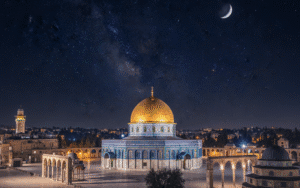The Power of Secret Worship: Your Path to Closeness to Allah

The Almighty Allah (SWT) created us solely for His worship. Therefore, dedicating this life to His service is our primary duty. This path is the only way to find true salvation, honor, and peace, both now and in the hereafter. When a servant achieves closeness to Allah, their journey to salvation becomes clear. In fact, performing secret acts of worship is one of the most powerful ways to build this connection. The more secret worship a person performs, the more they advance toward Allah’s pleasure and Paradise.
In today’s bustling world, filled with a culture of self-promotion, a believer’s greatest challenge is keeping their worship pure. It requires true Ikhlas in Islam to ensure our deeds are for Allah alone. For this reason, it is essential for each of us to have some secret deeds that no one on earth knows about; deeds known only to Allah, the Lord of the Worlds.
What is Secret Worship?: The Why and How
The word Ibadah (العبادة) literally means servitude, worship, or devotion. To worship Allah means we acknowledge His absolute sovereignty. Furthermore, it means we unconditionally obey His commands and present ourselves before Him with the utmost humility.
Imam Ibn Taymiyyah (may Allah have mercy on him) provided a beautiful and comprehensive definition. He said:
“Ibadah is a comprehensive term for every apparent and hidden word and deed that Allah loves and is pleased with.”
(Sahih al-Bukhari, Hadis: 4779)
This definition clearly shows that worship has two types: public and private. Acts of worship visible to people are public. In contrast, those performed in solitude, exclusively for Allah, are acts of secret worship.
The companion Zubayr ibn al-Awwam (RA) advised:
“Whoever among you is able to have a hidden good deed, let him do so.”
The Salaf (the righteous predecessors) were so keen on this that Ibn Dawood al-Khuraibi (RH) noted, “The Salaf desired that every person should have some secret good deeds that not even his wife or anyone else would know about.”
Public vs. Private Worship: Finding the Right Balance
After learning about these virtues, you might ask: should all worship be secret? The answer is no. Indeed, Islam provides a clear principle on this matter.
The guiding principle is this: it is generally better to perform obligatory (Fard) acts publicly. On the other hand, it is best to perform voluntary (Nafl) acts privately. This is because acts that are symbols (شعائر – Shi’ar) of Islam, like congregational prayer and Hajj, must be performed openly. For example, if someone performs obligatory prayers only at home, others might mistakenly think they don’t pray at all. Similarly, giving Zakat publicly can encourage others to fulfill their duty.
1. The Virtue of Voluntary Worship in Secret
The Messenger of Allah (ﷺ) said:
“A man’s voluntary prayer, offered where people cannot see him, is twenty-five times more virtuous than his prayer offered in front of people.”
(Sunan Abu Dawud, Hadis:1307)
2. Guidance on Giving Charity
Allah the Almighty says:
إِنْتُبْدُواالصَّدَقَاتِفَنِعِمَّاهِيَوَإِنْتُخْfُوهَاوَتُؤْتُوهَاالْفُقَرَاءَفَهُوَخَيْرٌلَكُمْ
“If you disclose your charitable gifts, it is excellent; but if you conceal them and give to people with low income, that is better for you.”
(Surah Al-Baqarah, 2:271)
Commenting on this verse, Imam al-Qurtubi explained that giving voluntary charity in secret is better. The reason is that it protects one from Riya (showing off). However, for obligatory Zakat, giving it publicly is preferable.
3. When to Perform Voluntary Worship Publicly
Sometimes, you can perform a voluntary act publicly. For instance, this is acceptable if it encourages others to do good or helps teach a provision of the religion. A scholar might pray the Duha prayer in public to teach others. Likewise, a wealthy person might donate publicly to inspire generosity. However, the greatest challenge here is maintaining a pure intention. For those with weaker faith, performing voluntary worship in secret is always the safer path.
The Astonishing Benefits of Secret Deeds
Secret worship introduces numerous positive effects into a believer’s life. Below are some of the key benefits of secret deeds.
1. A Sign of Sincere Faith:
First and foremost, secret worship is the greatest proof of genuine faith. This is because hypocrites only perform acts of worship to be seen by others. Therefore, obeying Allah in private is a quality only a true believer can possess.
2. Achieving Closeness to Allah and His Love:
Private devotion builds a deep, personal relationship between Allah and His servant, which is the ultimate goal of closeness to Allah. The Messenger of Allah (ﷺ) said,
“Indeed, Allah loves the servant who is God-fearing, self-sufficient, and hidden in his worship.”
(Sahih Muslim, Hadis: 2953)
3. Attaining Ikhlas and Freedom from Riya:
The two biggest destroyers of worship are Riya (showing off) and ‘Ujb (self-admiration). To achieve true Ikhlas in Islam, one must fight these diseases. Consequently, secret worship is the best antidote to protect the soul from them.
4. Appeasing Allah’s Anger:
Secret good deeds, especially secret charity, can extinguish the anger of Allah. The Messenger of Allah (ﷺ) said,
“Secret charity appeases the Lord’s wrath.”
(Musnad Ahmad, Hadis: 16183)
5. Spiritual Tranquility and a Pure Heart:
The spiritual peace you find when surrendering to Allah privately is unmatched. This practice helps transform the heart into a Qalb Saleem (a sound heart), which will be a cause for salvation on the Day of Judgment.
6. Earning Sincere Love from Creation: Whoever beautifies their private relationship with Allah, Allah in turn creates love for them in the hearts of people. Imam Ibn al-Jawzi stated that the root cause of this public acceptance is one’s secret deeds.
7. A Powerful Weapon in Times of Calamity :
Secret good deeds are a powerful tool for deliverance from hardship. The story of the three men trapped in a cave serves as the best proof. They were saved after they supplicated to Allah, mentioning their most sincere and secret deeds.
8. The Promise of a Good End (Husnul Khatimah):
How a person’s life ends often depends on their secret actions. Ibn Rajab al-Hanbali said that secret good deeds profoundly impact one’s final moments, leading to a Husnul Khatimah, or a beautiful ending.
9. Glad Tidings of Shade and Paradise:
On the Day of Resurrection, when no other shade exists, seven types of people will receive shade under Allah’s Throne. Notably, three of them are people of secret deeds. The Prophet (ﷺ) mentioned:
“…a man who is tempted by a woman of high status and beauty but he rejects her by saying, ‘I fear Allah’; a man who gives in charity so secretly that his left hand does not know what his right hand has spent; and a man who remembers Allah in private and his eyes shed tears.”
(Sahih al-Bukhari: Hadith 660)
Allah has prepared unimaginable rewards in Paradise for these hidden worshippers. In a Hadith Qudsi, Allah says:
“I have prepared for My righteous servants what no eye has ever seen, no ear has ever heard, and no human heart has ever conceived.”
(Sahih Muslim, Hadis: 2824)
Afterward, the Messenger (ﷺ) recited a verse from the Quran. Allah revealed this verse primarily to describe the reward for those who worship Him in secret, especially through the night prayer:
فَلَاتَعْلَمُنَفْسٌمَاأُخْفِيَلَهُمْمِنْقُرَّةِأَعْيُنٍجَزَاءًبِمَاكَانُوايَعْمَلُونَ
“And no soul knows what has been hidden for them of comfort for eyes as a reward for what they used to do.”
(Surah As-Sajdah, 32:17)
This highlights the immense Tahajjud benefits that await the sincere.
Practical Examples of Secret Worship
- Voluntary Night Prayer (Tahajjud) when the world is asleep.
- Helping the needy without revealing your identity.
- Remembering Allah (Dhikr) silently in your heart during work or leisure.
- Reciting the Quran quietly at a specific time each day.
- Making Dua (supplication) for a fellow Muslim in their absence.
- Fasting voluntarily so discreetly that even family members may not notice.
- Contributing anonymously to an Islamic project with your time or money.
Conclusion
In short, secret worship is a priceless treasure in a believer’s record and a mirror to their sincerity. In our age of social media, there is a constant race to publicize every action. This makes it more critical than ever to keep some deeds exclusively between yourself and your Lord. Ultimately, these small, hidden acts of devotion may be the very thing that elevates our status with Allah and secures our salvation on the Day of Judgment.
May the Almighty Allah help us all practice secret worship and grant us the sincerity to dedicate all our deeds solely for His sake. Ameen!
Frequently Asked Questions
What is secret worship (Ibadah)?
Secret worship refers to acts of devotion performed in private, exclusively for Allah, without the intention of being seen by others. It is the opposite of public worship and is considered one of the most powerful ways to build a personal and sincere connection with Allah.
Is it better to perform all acts of worship in secret?
No, not all worship should be secret. The guiding principle is to perform obligatory (Fard) acts publicly as they are symbols of Islam (e.g., congregational prayer, Hajj). In contrast, voluntary (Nafl) acts are generally better performed in private to protect one's intention from showing off (Riya) and to achieve a greater reward.
What are the benefits of performing secret deeds in Islam?
The article highlights several astonishing benefits of secret deeds, including:
- Sincerity: It is a sign of genuine faith, as it's done solely for Allah.
- Closeness to Allah: It builds a deep, personal relationship with Him.
- Protection from Riya: It helps protect a person from showing off and self-admiration.
- Divine Reward: It is a powerful means of appeasing Allah's anger and earning glad tidings, including being granted shade on the Day of Judgment.
Why is secret charity considered better than public charity?
Secret charity is considered better because it protects the giver from Riya (showing off) and self-admiration. The Quran states that while disclosing charitable gifts is good, concealing them is even better. This applies specifically to voluntary charity, as it ensures the deed is done with pure intention.









